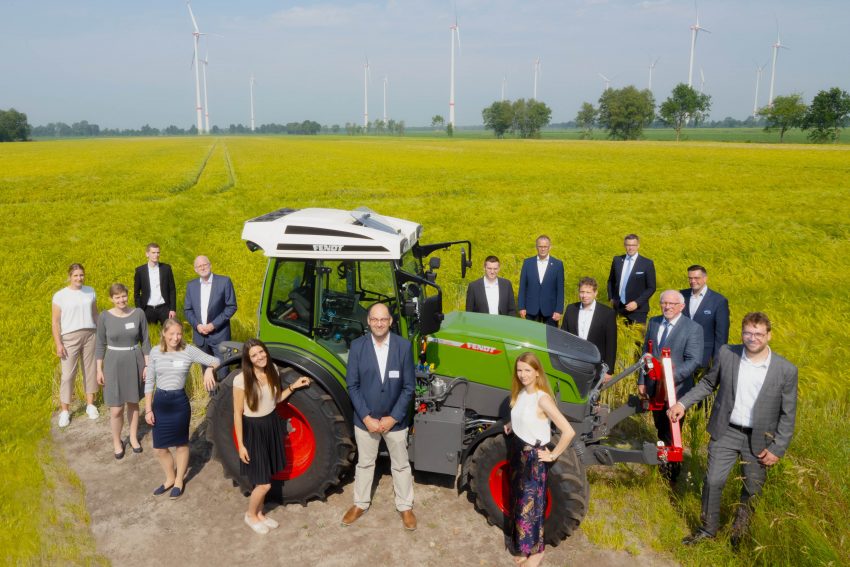Agriculture goes “green” First pilot project to use green regional hydrogen for agricultural mobility in Lower Saxony
The state of Lower Saxony is funding the H2Agrar joint project and the H2 Hub-Haren project with around €7.6 million under the hydrogen guideline. The aim of the projects is to establish a hydrogen infrastructure in the Emsland model region to supply the agricultural sector. TU Braunschweig is involved with the Institute for Mobile Machines and Commercial Vehicles.

The partners of the H2Agrar joint project. Professor Ludger Frerichs (fourth from left) and Kerstin Palm (second from left) from TU Braunschweig took part. Photo credit: Karl-Heinz Krämer/agrowea
In Emsland, a future model for sustainable mobility in agriculture is being created within Lower Saxony’s hydrogen landscape: the BW Fehndorf-Lindloh community wind farm near the town of Haren (Ems) in Lower Saxony will store wind energy in a large battery at peak times and feed it into an electrolyser to produce hydrogen.
In the first phase of the H2Agrar project, the project partners will develop concepts for the production, storage and logistics of green hydrogen for agriculture. The second phase of the project will test and demonstrate practical use at the application level.
In the course of the energy transition, rural areas and agriculture have made a significant contribution to the expansion of renewable energies by providing land. The infrastructural integration and use of “green hydrogen” in agriculture is therefore only logical.
One focus of the H2Agrar project is the development of an innovative concept to reduce greenhouse gas emissions from the use of fuel in agricultural machinery. At present, these are almost exclusively powered by fossil fuels. At six million tonnes of CO2 equivalent, agricultural machinery accounts for around 8.5 percent of total emissions in agriculture (Federal Environment Ministry, 2016). If we can replace fossil fuels with ‘green hydrogen’, these emissions can be almost completely eliminated, minimising the impact of greenhouse gas emissions.
Fuel cell powered tractors
In the H2Agrar project, TU Braunschweig’s Institute for Mobile Machinery and Commercial Vehicles is focusing on the suitability of fuel cell powered tractors for field work. Professor Ludger Frerichs explains: “One challenge is to adapt the tractor and its use to the expected lower energy storage capacity of hydrogen compared to diesel. Machine and process analyses are being carried out to evaluate different tank options, tractor concepts and dimensions.
Project participants
- AGCO AG
- CEC Haren GmbH (project coordination)
- Emden/Leer University of Applied Sciences
- Röchling Engineering Plastics SE & Co. KG
- Technische Universität Braunschweig
